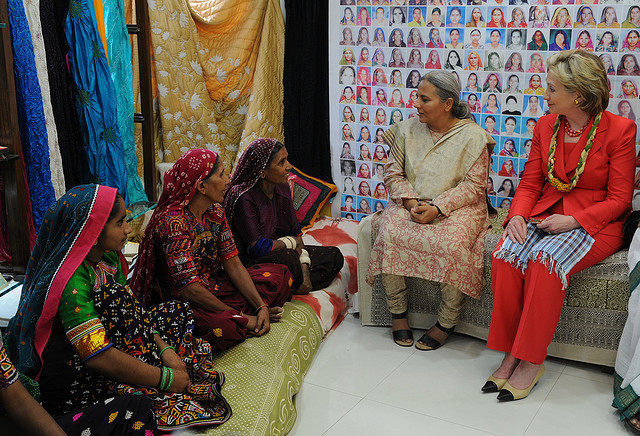SECRETARY CLINTON: Thank you. It is absolutely wonderful to be with you tonight for this first ever Global Fairness Initiative Award and to see so many of you here committed to the cause of ending poverty by giving poor people an equal shot at not only healthy, productive, fulfilling lives, but access to markets, access to credit, training, and the skills needed to take their innate abilities and translate those into a higher standard of living and greater opportunity.
I want to thank Andrea for that kind introduction and for going with me, even with a broken foot, on many of those thousands of miles that we have covered over the last 20 months. I want to thank Jeff Zucker, Brian Williams, and the team at NBC Universal for making this evening possible.
I want to recognize the Chair of GFI, Jose Maria Figueres, who, as you have just heard, has a long commitment to this. As president of Costa Rica, he helped usher in an era of economic growth and opportunity that still continues today. And to His Royal Highness the Prince of Wales, who has long been a leading voice on the importance of pursuing development in a sustainable manner, for the sake of the world’s workers and communities, as well as our planet’s future.
And finally, let me thank a longtime friend, Karen Tramontano, who has worked with my husband and me for many years. It’s her vision that has guided the Global Fairness Initiative from its earliest days, and I want to applaud Karen and her partners on the milestone they’ve reached tonight, with the first ever Fairness Award.
Now, the Global Fairness Initiative aims at a simple fact: billions of people worldwide are trapped in poverty. And many of them do have the skills and the determination to build better lives, but that’s not enough to surmount the barriers that stand in their way. Unfair trade practices, low wages, poor health care, inadequate schooling – these are obstacles that are really hard, and it’s often the rare lucky person who somehow surmounts them on their own. Most people need help. Otherwise, their talents and abilities lie fallow, and we lose the contributions that they could be making to their families, communities, countries, indeed to the world.
Now, there was a time, not long ago, when it seemed practically impossible to conceive of solutions big enough and smart enough to deal with global poverty. But now, we have a bolder view of what’s possible, because we’ve seen approaches that drive and deliver long-term, high-impact results.
And tonight, we are honoring a woman whose work has been at the leading edge of the fight against poverty.
Ela Bhatt has upended the old ways of thinking and compelled all of us to raise our collective ambitions about what we can do to close the gap between the rich and the poor.
She has spent nearly every day of the past four decades helping move more than a million poor women in India to a position of dignity and independence, gaining access to opportunities they never dreamed possible. Like the chance to start a business or send their daughters and their sons to school, open their own bank account, or simply be treated with respect by their husbands, their mothers-in-law, their neighbors, and authorities.
A great deal has already been said and written over the years about Ela's impact on India and the world.
About the innovative programs she pioneered, making it possible for the very poor to gain access to services that were once the sole purview of the well-off—like credit, like banking, sick leave, and child care.
Or about her conviction that women are the key to progress—that investing in women is one of the most powerful ways to fight poverty.
Now, these ideas 40 years ago were revolutionary. They’re still in some quarters considered revolutionary. But in many others, they are now widely embraced. Ela carried that message. She literally made people understand and accept her vision by proving its workability time and again.
But tonight, I’d like to consider Ela’s impact from another angle.
The work that she has done through the Self-Employed Women’s Association is not only about finding solutions to the problems of poverty. At its most basic level, Ela’s work is about fairness, about giving every person the chance to achieve his or her dreams, to make the most of his or her God-given potential—no matter how rich or poor, no matter whether they work in a factory or a home or on the side of a road.
I often say that talent is universal, but opportunity is not. And that is inherently unfair. It is not fair that whether people get the chance to express their talents depends, to a large extent, on who their parents are or where they live. It’s not fair that something none of us had any choice in—where and to whom we were born—has such an impact on the course of our lives.
And so we have to be in Ela’s corner, because she has proven it doesn't have to matter so much. Inequality may always be with us. But even in places where it is most stark, people still should be able to develop their ambitions and direct them toward building better lives. And Ela and SEWA have proven that.
I have known Ela for 15 years and I heard about her before I met her in 1995, when I traveled as First Lady to Ahmadabad¸ in India, where SEWA has its headquarters. I didn’t quite know what to expect and I was overwhelmed by what I found. I was greeted by a huge group of women, wearing saris that were all the colors of the rainbow. Many of them had walked 12 to 18 hours to get to the meeting with me. Many of them were rag pickers. We sat together under a sweltering tent and I listened as, one by one, they told me about how SEWA had changed their lives and how they now had a belief in themselves that was absolutely unthinkable before they became involved.
I heard wonderful stories about the problems they had at home when they decided to step out into the marketplace, how often it was by necessity because the husband would have an accident and could no longer work, or a sickness in the family that required more income. They told me about the problems of moving into their husband’s home and basically being at the beck and call of their mother-in-law. They told me what it was like when they finally set up their market stall and were constantly harassed by the police and other authorities.
And yet they told it with such pride and unmistakable dignity that you just couldn't help but feel that you were in the presence of not only a great woman, Ela Bhatt, but so many other women who, for the first time, understood what they could do for themselves.
When the last woman had spoken, they all started singing together. They sang in their native language, so at first I couldn’t quite tell what the song was. But I quickly realized they were singing “We Shall Overcome.” So there we were, holding hands with these beautiful women, moving to a great hymn and a battle cry, an anthem from the American Civil Rights Movement, and it was all so fitting.
Because what Ela has done is to help the poor find freedom, and with freedom they have also found opportunity. And she has helped not only women in India but women in South Africa, in Pakistan, Afghanistan, and inspired so many others to find their own way forward to overcome long legacies of inequality and unfairness. She has helped us imagine and then work toward a fairer world.
So for her contribution to India and particularly the women of India, and to the global community, it is my honor to present the first Global Fairness Award to my friend, Ela Bhatt. (Applause.)












